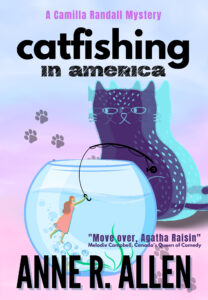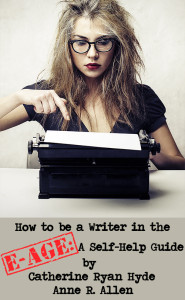I’ve got a special treat for you today. My dear friend Anne R. Allen is here! If you’re not following her blog, you should remedy that immediately. It’s a must-read for all writers.
So okay, what the heck is “Chekhov’s gun?”
It’s a reference to advice the great Russian playwright and short story writer, Anton Chekhov, (1860-1904) gave young writers:
“If in the first act you have hung a pistol on the wall, then in the following one it should be fired. Otherwise don’t put it there.”
In other words, he says we shouldn’t clutter the story with things that have no relevance. If chapter one says your heroine won a bunch of trophies for javelin throwing, which she displays prominently on the wall alongside a javelin once thrown by Uwe Hohn, somebody had better darn well throw a javelin before the story is done.
Setting Details vs. Chekhov’s Gun
Yeah, but what if that javelin is there to show us what her apartment looks like? It’s good to show her décor, because it gives an insight into her character, right?
It depends. Yes, it’s good to use details to set tone and give depth to our characters.
But what’s all important is how you stress those details when you first present them. If there’s a whole page about those javelin throwing trophies, and the characters have a conversation about whether anyone will ever break Uwe Hohn’s throw record of 104.80 meters, you gotta toss some javelins. But if there’s just a cursory mention, “her apartment walls were decorated with an odd assortment of personal trophies and long spears,” then you can leave them on the wall.
In other words, not every lampshade the author mentions has to show up two chapters later on the head of a drunken ex-boyfriend, but you need to be careful how much emphasis you put on that lampshade.
What, No Red Herrings?
Wait just a goldern minute, sez you. I write mysteries! Mysteries need to have irrelevant clues and red herrings. Otherwise the story will be over before chapter seven.
This is true. But mystery writers need to manage their red herrings. If the deceased met his demise via long pointy spear-thing, probably thrown from a considerable distance, then your sleuth is going to look like a very viable suspect to the local constabulary.
But of course she didn’t do it because she’s our hero, so the javelin on the wall and the trophies are red herrings.
But they still need to be “fired.” Maybe not like Chekhov’s gun, but they need to come back into the story and be reckoned with. Like maybe the real killer visited her apartment earlier when delivering pizza, then broke in to “borrow” the Hwe Hohn javelin, but he couldn’t get it into his Kia, so in the end he used a shorter, more modern javelin…
Chekhov’s Gun and Subplots
I’ve been running into this problem in a lot of fiction lately: I find myself flipping through whole chapters that have nothing to do with the main story. That’s because the subplot isn’t hooked in with the main plot. It’s just hanging there, not furthering the action.
The subplot becomes the unfired Chekhov’s gun.
For instance, one mystery had the protagonist go through endless chapters of police academy training after the discovery of the body. The mysterious murder wasn’t even mentioned for a good six chapters. I kept trying to figure out how her crush on a fellow aspiring policeperson was going to solve the mystery.
I finally realized it wasn’t. None of the romance stuff had to do with the mystery. When I finally flipped through to a place where the main plot resumed, the hot fellow student didn’t even make an appearance. He’d already gone off with a hotter fellow recruit.
It’s fine to have a romance subplot in a mystery — in fact, that’s my favorite kind. But the romance has to take place while some mystery-solving is going on.
But if that romance doesn’t trigger a new plot twist or reveal a clue, then it’s an unfired gun on the wall. It’s just hanging there, annoying your reader, who expects it to be relevant.
Naming a Character Creates a Chekhov’s Gun.
Another “unfired Chekhov’s gun” situation often comes up with the introduction of minor characters and, um, “spear-carriers.”
You don’t want to introduce the pizza delivery guy by telling us how he got the nickname “Spear” followed by two paragraphs about his javelin-throwing expertise — unless he’s going to reappear later in the story. And he’d better be doing something more javelin-related than delivering another pie with extra pepperoni.
This is a common problem with newbie fiction. In creative writing courses we’re taught to make every character vivid and alive. So every time you introduce a new character, no matter how minor, you want to make them memorable. You want to give them names and create great backstories for them.
Don’t give into the urge, no matter what the creative writing teacher in your head is saying.
If the character is not going to reappear, or be involved with the plot or subplot, don’t give him a name. Just call him “the pizza guy” or “the Uber driver” or “the barista.”
A named character becomes a Chekhov’s gun. The reader will expect that character to come back and do something related to the plot.
Beware Research-itis
A lot of unfired guns come from what I call research-itis. That’s when the author did a heckuva lot of research and goldernit, they’re going to tell you every single fact they dug up.
You’ll get three chapters on the historical significance of the javelin in Olympic competitions, going back to ancient Greece. And the popularity of depictions of javelin throwers in Hellenistic art. And how both Zeus and Poseidon are depicted throwing their thunderbolts and tridents like javelins…
None of which has anything to do with the dead guy in the back yard with the big pointy spear in his back.
If the reader doesn’t need to know it to solve the mystery and it’s not a red herring, keep it to yourself.
Although a lot of that research will come in very handy for blogposts and newsletters when you’re marketing the book, so don’t delete any of those research notes!
Beta Readers and Editors Can Take Chekhov’s Gun Off Your Wall
It’s tough to weed out all those unfired guns in your own work.
You’re sure you absolutely need to tell us that our heroine won those trophies when she was on her college javelin team where her nemesis, Rosalie Rich, once stole her glasses before a meet…and she found out she could throw better without them and didn’t need glasses after all, which was great because her glasses made her look dorky and after she stopped wearing them, Lance Spears noticed her for the first time. He turned out to be a creep, but…
Your editor will disagree. And eventually you will thank her for it.
So will your readers.
Have you ever left a Chekhov’s gun on the wall? Are you annoyed when you find them in published books? What’s the worst Chekhov’s gun mistake you’ve found in fiction?
 Anne R. Allen is a popular blogger and the author of the bestselling Camilla Randall Mysteries as well as the Boomer Women Trilogy and the anthology Why Grandma Bought that Car (Kotu Beach Press.) Her most recent mystery is Catfishing in America (Thalia Press) a comic look at romance scams. Her mystery The Gatsby Game is being published in French at the end of this month. Anne’s nonfiction guide, The Author Blog: Easy Blogging for Busy Authors, is an Amazon #1 bestseller that was named one of the 101 Best Blogging Books of All Time by Book Authority. She’s also the co-author, with Catherine Ryan Hyde, of the writer’s guide How to Be a Writer in the E-Age. She blogs with NYT million-copy seller, Ruth Harris, at “Anne R. Allen’s Blog…with Ruth Harris.” You can find them at annerallen.com.
Anne R. Allen is a popular blogger and the author of the bestselling Camilla Randall Mysteries as well as the Boomer Women Trilogy and the anthology Why Grandma Bought that Car (Kotu Beach Press.) Her most recent mystery is Catfishing in America (Thalia Press) a comic look at romance scams. Her mystery The Gatsby Game is being published in French at the end of this month. Anne’s nonfiction guide, The Author Blog: Easy Blogging for Busy Authors, is an Amazon #1 bestseller that was named one of the 101 Best Blogging Books of All Time by Book Authority. She’s also the co-author, with Catherine Ryan Hyde, of the writer’s guide How to Be a Writer in the E-Age. She blogs with NYT million-copy seller, Ruth Harris, at “Anne R. Allen’s Blog…with Ruth Harris.” You can find them at annerallen.com.
Don’t miss Anne’s new release! CATFISHING IN AMERICA is a mashup of mystery, romcom, and satire.



